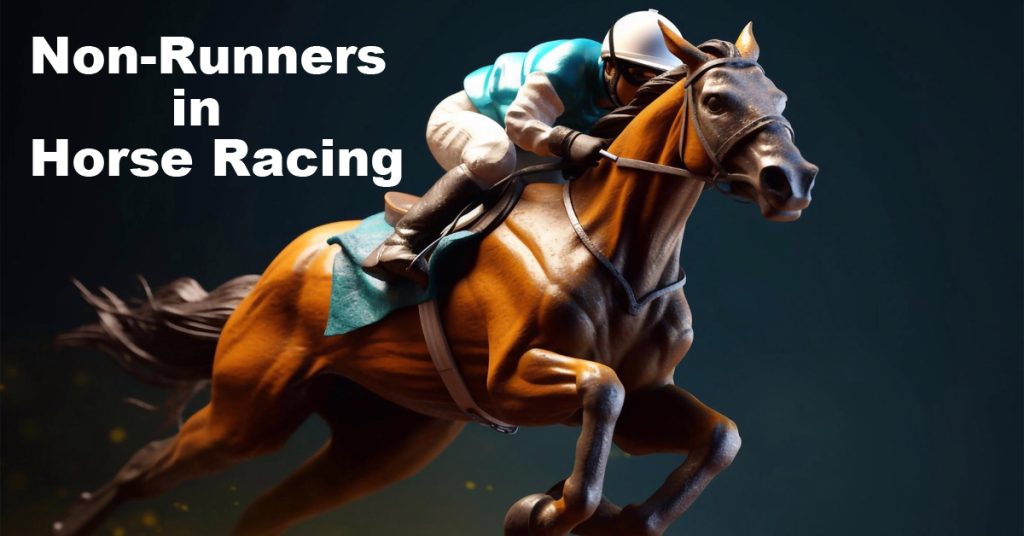
We’ll go into more depth about how those who are declared non-runners very late in the race can significantly impact the betting.
What Does a Non-Runner Mean in Horse Racing?
A horse that was scheduled to compete in a race is called a runner, but when the horse does not end up starting the race, it becomes declared as a non-runner (NR) in horse racing. This is not the same as a horse that refuses to start or stays at the starting gates after they open. A horse is considered a “non-runner” even if it withdraws just before post time or even shortly after the final declarations, which may happen up to two days before the race.
Reasons for Horses Becoming Non-Runners in Horse Racing
Trainers have a wide range of reasons for pulling out a declared runner from a race. In an effort to halt what was perceived as an increase in non-runners, the BHA has recently tightened some of those justifications.
The following are the reasons listed for a non-runner along with the possible outcomes:
The Going: The going can change quickly. Horses may be declared on good to firm ground, but should it come up soft on race day trainers have every right to pull their horse out and save it for another day.
The horse suffers from an illness or injury: After declaration time, horses may experience an injury or not feel well, making them unable to run the race. Although trainers can proclaim a non-runner with a self-certificate, a veterinarian certificate is typically required.
Travel problems: Sometimes traffic issues might cause horses to arrive at the races late. Thus, it is reasonable to consider them a non-runner. For “other,” “travel,” or “self-certificate,” trainers must provide further details on why their equine is unable to compete.
The horse refuses to enter stalls: There are several opportunities for horses to enter the starting stalls in flat racing. If they still won’t give in, the starter could give up and allow the horse in issue to leave the field. They are formally considered non-runners because they haven’t met the starter.
How A Non-Runner Affects Racing Bets
The moment a horse is declared a non-runner doesn’t always change his status, but it can have a big impact on bets and odds. When your horse is declared, you will get your stake money back on the non-runner as long as you were not betting in the ante-post market and it was officially announced for the race before you supported it.
The market for the remaining runners decreases when a favourite is ruled out. This normally gets done well in advance, frequently even before many bettors have placed any wagers on the event at all. However, occasionally a horse is pulled from the race extremely late, frequently just before the start, for misbehaving in the stables or refusing to enter. If this is the case, Rule 4 could be applicable.
What is Rule 4 and How Does It Affect Your Bets?
Winning horse racing bets may be deducted under Rule 4. When a horse is withdrawn too late, bookmakers cannot quickly create a fresh book, which happens when the race and its odds are significantly affected by that horse’s decision not to run.
Depending on the horse that is withdrawn and the size of the field, either a deduction under Rule 4 may apply, or none at all in this sport. Rule 4 may not be used if a 40/1 horse withdraws from a race with 20 runners because it is believed that the withdrawal would not significantly affect the result of the race.
The odds as stated above would still apply, but Rule 4 would surely be applied if the favourite or second favourite were to withdraw. The Rule 4 deduction means a larger amount from all winning bets the shorter the runner’s price will be deducted. Rule 4 may deduct 10p, 20p, or even 50p from winning bets per pound.
Ante-Post v On the Day Races
Bettors who put bets in the “ante-post” market do so in anticipation of the final official declarations, which are often done days, weeks, or even months beforehand. Because more possible runners are listed in these markets and you would not receive your money back should your horse not compete, the odds are larger and more alluring.
If a horse does not take part in a race after the declaration time, meaning bettors receive their money back, the horse is referred to as a “non-runner” in horse racing jargon.
Non-Runners in Accumulators and Pool Bets
Single-bet non-runners are simple to handle; you will receive your investment back if your horse does not run. It’s that easy. However, there is a wide variety of bets available in horse racing, and non-runners can impact them in numerous ways.
Doubles, Trebles and Accumulators
If you place a multiple wager and one or more of your choices are deemed non-runners, they are simply removed from the wager, reducing the total amount wagered. When there is one non-runner in a 4-fold, it becomes a treble; when there are two non-runners in a double, it becomes a single; and so on.
Pool Bets
Non-runners also impact pool betting, including Tote bets. For a single bet, the standard guidelines are in effect; if the runner does not finish, a punter will receive his stake back.
Even so, multi-leg Tote bets including Jackpot, Quadpot, and Placepot bets are more susceptible to being impacted by non runners. This is an automatic bet on the eventual favourite if your horse does not finish. At the last minute, your favourite could change, so you might not know which horse to back until the outcome is fixed.
Reducing Non-Runner Numbers
In recent years, there has been a rise in the number of non runners in Britain, while on a different note, the field sizes have been getting smaller and smaller. To counter this, the racing authorities are attempting to deal with the problem of non runners, partly as a means of safeguarding bettors. The BHA has attempted to address the rise of non runners in part by implementing the following measures:
49-hour declarations are now available: Final announcements two days before a race have long been a standard in flat racing. The technique is reserved for select high-profile events in jump racing. Trainers who receive 48-hour declarations have two full days to identify any issues and get their horses out.
The stewards’ inquiries: Stewards on race day may look into runners who are deemed fit yet are pulled from the race because of the course. They take this action if a horse that is being deemed a non-runner has run on the same course before.
Preventing self-certification: Self-certification is an option available to trainers. They may, however, be prohibited from self-certification for up to a year if they have 100 declarations or more and a non-runner rate of 50% or above.
Our Full List of the Best Horse Betting Sites
Whether you’re an expert racing bettor or just a beginner, you’ll agree with us that horse racing is one of the most well-liked sports in the UK betting industry! To assist those of you searching for a new horse racing bookmaker, Mr. Betting’s racing specialists have compiled an extensive and unique list of the top horse racing websites and offers in the UK.
Those of you who may be new to using online sportsbooks to wager on this sport should take full advantage of our comprehensive list of bookies that provide the most value for your money.
FAQ
Is a horse ruled out of the race if it refuses to run?
Your choice won’t be deemed a non-runner if the race begins and it refuses to run or leave its stall. It will be classified as a hauled-up horse or non-finisher instead. You will lose your wager in these circumstances in online gambling.
Are ante-post non-runners occasionally not considered as losing wagers?
If a runner fails to finish, some bookmakers may reimburse the ante-post investment. This is uncommon and often only occurs in conjunction with special promotions or during significant events. Normally, non-runner ante-post wagers are lost.
After being ruled a non-runner, can a horse be brought back to the race?
Nope. A horse is no longer eligible to compete in a race once it has been proclaimed and doesn’t run. The horse may not be entered again, regardless of errors committed by the jockey, owner, or trainer. This is to stop dishonesty from individuals associated with the horse as well as those who place bets on it.
How can I determine whether my horse will be a non-runner?
A few minutes before the race, you may easily find out if your horse is a non-runner by looking at the starting lineup. If you use our suggested bookies, each one will give live updates from the best races from around the world. As an alternative, you might go over the daily non-runner listings for horse racing. These are often managed by outside operators and are designed to track every horse that isn’t running in a single day.







